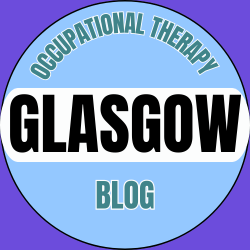Welcome to the next instalment of my series on the GCU Occupational Therapy Blog, ‘Occupational Fellow-py’. If this is your first time reading this, hello. You can find out a bit about me here and here.
This is my first blog post in over a year. Yikes, sorry about that! As we approach the midway point of 2024, and following Prof Bannigan’s inspiring Elizabeth Casson Memorial Lecture, one of my goals is to be more consistent in my writing output, including this blog. I have lots to update and reflect on, so keep your eyes peeled for more regular posts from me.
I am approaching the end of my NIHR Clinical Doctoral Fellowship and the PhD programme at the University of Plymouth. In the coming weeks and months, my blog posts will offer reflections on this final stage and, hopefully, some suggestions based on my experience that will help you on your journey. I submitted my thesis for examination in April of this year, and this piece offers some suggestions to help you with your writing. Even if you’re just starting to think about your thesis or are in the thick of writing.
1. Plan, plan, plan, and then do some more planning

An overarching plan (or at least a first draft, with some ideas for chapter titles) will guide your reading and later writing. In my experience, if you have an idea of what you want to say and the direction of travel, this will facilitate the writing process and help with narrative flow. I started this planning well before writing, save for some spontaneous ideas I had to jot down in my research journal. I had invaluable feedback from my supervisors on my ideas, so do discuss your proposed plan with your supervisors. Don’t panic if you haven’t written much in the first few months; take your time for your literature review and establish a coherent narrative structure. Be aware that this can evolve and change over time. Investing time in planning helped to smooth the thesis writing process for me, which meant I could focus my brain capacity on writing.
Another benefit of setting up the long document in advance was checking that all the software I used, like Endnote, was set up correctly and worked. I also set the document to align with the Doctoral College’s requirements, such as borders, line spacing, heading style, etc. I could then be confident that the final draft met the style expectations, save for some last-minute tweaks. Save yourself the stress and set everything up before you start writing. Don’t leave it to the end!
2. Set up your document (s) in advance
This suggestion overlaps with my first point and is included in planning but focuses more on the technical aspects of writing. Some students write their thesis in separate documents and combine them. Others tend to write a ‘long document’ encompassing all the additional sections. These documents are lengthy (as the name suggests) and incorporate multiple sections and chapters with consistent formatting. Word processors often have long document functionality that allows you to generate content tables and the like automatically. I opted to use a long document format to ensure that everything was consistent and there were no issues integrating references, etc. I discussed this with my supervisors and recommend you do the same. They will be looking at this for you, so you need to agree on a format that works for you both.
3. Write consistently

Keeping momentum is critical, which is true for writing something substantial like a thesis. I wrote every day. Some working days were dedicated to thesis writing, and others would have several hours devoted to it during my main writing period. Doing some writing every day was crucial. I used a couple of other tips to help with momentum. During my NIHR-funded MClinRes, Dr Joe Allison from the University of Plymouth recommended that I write for at least 15 minutes daily. This approach aimed to maintain a connection with your writing and keep momentum. It doesn’t matter if you write 15 or 150 words in that time; it helps maintain momentum. In my main writing period, I made sure to do my 15 minutes on the weekends and my clinical day, which helped me keep my connection with the thesis and made it easier to pick up on my main writing days.I highly recommend joining the regular GCU Occupational Therapy Writing Group. Not only does this aid consistency, but the group setting and goal-focused writing time also provide accountability, which aids productivity. You can find out more about the writing group here.
4. Don’t be afraid of feedback
If you fear negative feedback, I think learning not to take feedback personally is essential. This is an important skill to develop as an aspiring clinical academic, not just when writing your thesis. After all, it is not who you are being judged, but a small part of your work that you provided at a specific moment. This does not reflect who you are or your general knowledge of your subject. Your supervisory team are there to help you improve your work and inspire you. I think feedback should be seen as a gift to help achieve this. Feedback is your friend.
5. Find what works for you
Over time, I also understood that you must find your work rate and style. I tended to compare myself to others and feel guilty for starting less early in the morning, but in reality, I understood that it didn’t matter. My most productive writing time is in the afternoon and early evening, so I structured my days to reflect that. At the weekends, I just wanted to get it out of the way, so I did it first thing in the morning. I worked as much as others but at different times and at my own pace. Some people like to write silently; I like music in the background. Long story short, testing different work times and seeing what works best for your productivity is essential.
6. Make time for you!
Writing a thesis can become all-consuming if you let it. To be effective and happy, even if you have a lot of work, please take time for yourself! This will be reflected in your writing. Sometimes, you need to just sit and ponder, which doesn’t have to be in front of a computer screen at a desk. Some of the writing I’ve been most proud of has come about in a coffee shop, in the park, or after a tough gym session. Looking after yourself is paramount. Ultimately, whilst it is important, a thesis is not worth making yourself miserable or affecting your health over. Make sure that you take breaks (I found the pomodoro technique particularly helpful) and do things that nourish your body and spirit.

I hope the few thoughts I have tried to summarise will be helpful to you. Good luck to all of you who are thinking about starting, who are writing, or just about to hand in your thesis!
I thank my supervisory team (Prof Katrina Bannigan at GCU, Prof Jon Marsden at the University of Plymouth, Dr Ingrid Sturkenboom at Radboud UMC) for the numerous drafts they read and the invaluable feedback that they provided when writing my thesis. I can be contacted at christopher.lovegrove@postgrad.plymouth.ac.uk .

Written by
Chris Lovegrove
NIHR Clinical Doctoral Research Fellow (University of Plymouth)
Occupational Therapist (Royal Devon & Exeter NHS Foundation Trust)
Twitter: @Clovegrove_OT

